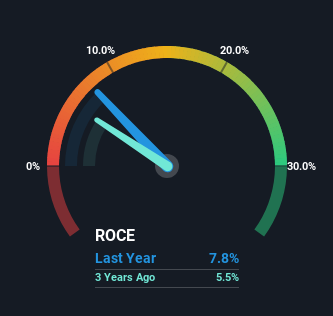- Japan
- /
- Auto Components
- /
- TSE:7244
Some Investors May Be Worried About Ichikoh Industries' (TSE:7244) Returns On Capital

Finding a business that has the potential to grow substantially is not easy, but it is possible if we look at a few key financial metrics. Typically, we'll want to notice a trend of growing return on capital employed (ROCE) and alongside that, an expanding base of capital employed. Basically this means that a company has profitable initiatives that it can continue to reinvest in, which is a trait of a compounding machine. However, after investigating Ichikoh Industries (TSE:7244), we don't think it's current trends fit the mold of a multi-bagger.
Return On Capital Employed (ROCE): What Is It?
For those who don't know, ROCE is a measure of a company's yearly pre-tax profit (its return), relative to the capital employed in the business. The formula for this calculation on Ichikoh Industries is:
Return on Capital Employed = Earnings Before Interest and Tax (EBIT) ÷ (Total Assets - Current Liabilities)
0.078 = JP¥6.0b ÷ (JP¥126b - JP¥49b) (Based on the trailing twelve months to March 2024).
So, Ichikoh Industries has an ROCE of 7.8%. In absolute terms, that's a low return but it's around the Auto Components industry average of 6.5%.
See our latest analysis for Ichikoh Industries

Above you can see how the current ROCE for Ichikoh Industries compares to its prior returns on capital, but there's only so much you can tell from the past. If you'd like, you can check out the forecasts from the analysts covering Ichikoh Industries for free.
What The Trend Of ROCE Can Tell Us
When we looked at the ROCE trend at Ichikoh Industries, we didn't gain much confidence. Over the last five years, returns on capital have decreased to 7.8% from 13% five years ago. Meanwhile, the business is utilizing more capital but this hasn't moved the needle much in terms of sales in the past 12 months, so this could reflect longer term investments. It's worth keeping an eye on the company's earnings from here on to see if these investments do end up contributing to the bottom line.
In Conclusion...
To conclude, we've found that Ichikoh Industries is reinvesting in the business, but returns have been falling. And investors appear hesitant that the trends will pick up because the stock has fallen 38% in the last five years. Therefore based on the analysis done in this article, we don't think Ichikoh Industries has the makings of a multi-bagger.
One more thing to note, we've identified 3 warning signs with Ichikoh Industries and understanding them should be part of your investment process.
For those who like to invest in solid companies, check out this free list of companies with solid balance sheets and high returns on equity.
New: AI Stock Screener & Alerts
Our new AI Stock Screener scans the market every day to uncover opportunities.
• Dividend Powerhouses (3%+ Yield)
• Undervalued Small Caps with Insider Buying
• High growth Tech and AI Companies
Or build your own from over 50 metrics.
Have feedback on this article? Concerned about the content? Get in touch with us directly. Alternatively, email editorial-team (at) simplywallst.com.
This article by Simply Wall St is general in nature. We provide commentary based on historical data and analyst forecasts only using an unbiased methodology and our articles are not intended to be financial advice. It does not constitute a recommendation to buy or sell any stock, and does not take account of your objectives, or your financial situation. We aim to bring you long-term focused analysis driven by fundamental data. Note that our analysis may not factor in the latest price-sensitive company announcements or qualitative material. Simply Wall St has no position in any stocks mentioned.
Have feedback on this article? Concerned about the content? Get in touch with us directly. Alternatively, email editorial-team@simplywallst.com
About TSE:7244
Ichikoh Industries
Designs, develops, manufactures, and sells automotive lamps and other products for automobile manufacturers in Japan and internationally.
Flawless balance sheet, good value and pays a dividend.
Similar Companies
Market Insights
Community Narratives


